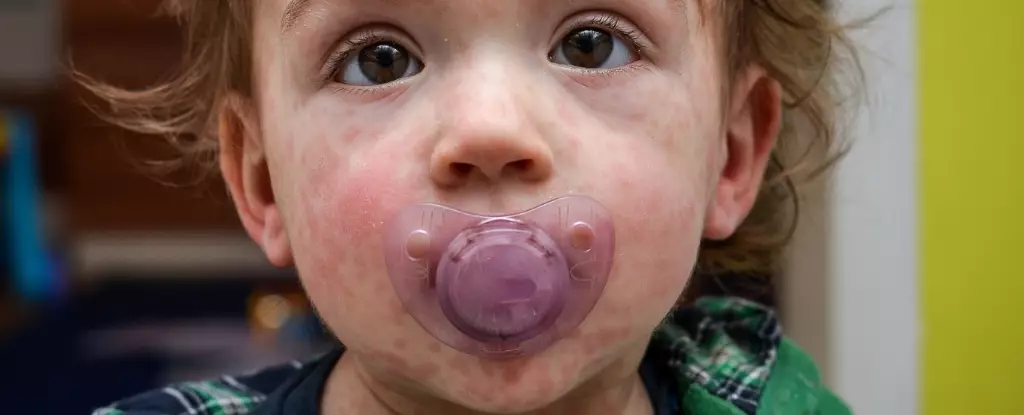In a disheartening trend, measles cases around the globe surged by 20 percent in 2023, resulting in an estimated 10.3 million infections. This figure, as highlighted in a recent joint report by the World Health Organization (WHO) and the U.S. Centers for Disease Control and Prevention (CDC), underscores a concerning decline in vaccination coverage—an essential barrier against one of the most infectious diseases known to humankind. The findings starkly reveal that deficiencies in immunisation strategies are fueling this alarming rise, exposing the fragility of global public health systems in the face of preventable diseases.
Measles, characterized by its capacity to spread rapidly, requires a staggering 95 percent vaccination rate through two doses of the measles/rubella vaccine to ensure community immunity. Alarmingly, only 83 percent of children worldwide received their first dose in 2023, stagnant from the previous year and a significant drop from 86 percent pre-COVID-19 pandemic levels. Furthermore, the second dose coverage saw a plunge to just 74 percent. Such statistics highlight not only a decline in vaccine uptake but point to broader systemic failures in health services which must be urgently addressed to halt this preventable disease’s resurgence.
The importance of the measles vaccine cannot be overstated. WHO chief Tedros Adhanom Ghebreyesus emphasized the vaccine’s unparalleled success over the last five decades, attributing countless lives saved to its widespread distribution. Health officials, including CDC director Mandy Cohen, reaffirm the necessity of continued investment in vaccination programs to bolster access. This is particularly crucial given the increasing number of measles outbreaks globally. In 2023, 57 countries reported significant outbreaks, up from 36 the prior year. Such a rise calls into question the adequacy of current public health policies and the commitment of governments to immunisation strategies.
Notably, the African region suffered the brunt of these outbreaks, emphasizing the link between geographical disparities in health access and vaccination rates. With nearly half of all large disruptions occurring in Africa, the disconnect between health resource allocation and the actual needs on the ground becomes painfully evident. This situation is further complicated in conflict-affected and fragile regions where healthcare infrastructure is often in shambles.
Global Health Disparities and the Tragedy of Preventable Deaths
The heartbreaking toll of measles extends beyond mere infection numbers. In 2023, approximately 107,500 deaths were attributed to the virus, with the vast majority being children under five years old. While this marked an eight percent decline from the previous year—largely due to better nutritional conditions and access to healthcare in certain regions—the loss of life due to a preventable illness remains tragic and unacceptable. The WHO and CDC highlight the urgent need for a coordinated global response to prevent such needless deaths.
As progress towards eliminating measles as a global health threat by 2030 hangs in the balance, efforts must accelerate. According to the report, 82 countries have either achieved or maintained measles elimination. Brazil’s recent success in reaffirming its measles-free status sparks hope, particularly in the Americas, which has been declared free of endemic measles. Unfortunately, the picture remains far more dire in regions such as Africa, where vaccination coverage is critically low.
To effectively combat the measles resurgence, immediate and focused actions are required. Governments, non-profit organizations, and international health agencies must prioritize reaching communities with the lowest vaccination rates, especially in high-risk areas. This includes deploying mobile vaccination units, increasing awareness and education about the importance of vaccines, and enhancing healthcare systems in fragile states.
Time is of the essence to safeguard the health of future generations. The commitment to immunization must be unwavering, breaking down barriers that hinder access and prioritizing the most vulnerable populations. Only through collective effort can the tide of measles infections be turned, ensuring that children everywhere receive the life-saving vaccines they need to protect their health and well-being. The fight against measles is not merely a health issue; it is a moral imperative that reflects our commitment to global equity and the fundamental right of every child to live without the threat of preventable diseases.


Leave a Reply